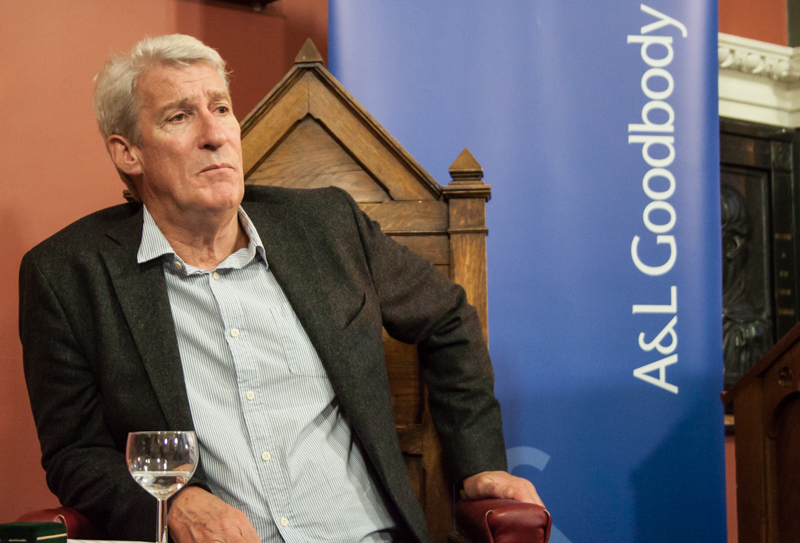Former presenter of BBC’s Newsnight Jeremy Paxman visited Trinity’s Law Society this evening to receive the Praeses Elit award for his outstanding contribution to the field of journalism. The broadcaster and presenter of University Challenge spoke about the role of social media in the evolution of journalism, the upcoming US election and Brexit, in between personal reflections on his career.
After introducing RTÉ journalist Sinéad Crowley as the evening’s moderator, Law Soc Auditor, Hilary Hogan, explained to all present that the award was presented to those who are “best loved” in their chosen field of expertise. In his characteristically forthright manner, Paxman wasted no time in challenging the award that Law Soc had deemed him worthy of.
Displaying the award for the audience, Paxman told all present that it was a “treat to receive this gong” and looked forward to using it as a “paperweight”. To a thoroughly amused audience, he recalled the “oily” letter that he had received from the society which had been mistakenly addressed to a “Ms Paxman”. The letter explained the glory of receiving such an award and assured him that it was only administered to an elite few. Aware of this “shameless stunt”, Paxman added knowingly that “I can spot when I’m being buttered up”. Even so, it would seem that the journalist could not turn down the opportunity to join the society’s prestigious list.
Paxman then moved to discuss the current state of British journalism. He raised his concerns about the future of print media, which he sees to be “in serious trouble”. While noting that “the world of words on paper seems to me to have gone”, Paxman pointed out that hardly anyone has worked out a way to make the words on screen “pay”.
Paxman remained critical as he moved to discuss television. Of the BBC, he remarked that it is “hard to find a worse-run organisation in Britain”. The broadcaster was slightly less condemning of Channel 4, though his upcoming series Rivers with Jeremy Paxman may have had something to do with that – a series which he later described as “at the warm bath end of television”. On Channel 4, Paxman further remarked that “Gogglebox is genius”, but saw their recent purchase of the Great British Bake Off as “pretty stupid”. In praising the work of Channel 4 News, however, Paxman moved to discuss the responsibility of the reader or, in this case, the viewer.
As an avid reader and viewer himself, Paxman told his audience that he “takes three newspapers everyday”. He further explained that he does this “not for the news, but for what they have made of the news”. In this vein, Paxman asked his audience to be more conscientious of where they are choosing to source their news, and entertained the notion of social media having replaced mainstream media.
Paxman was disapproving of social media, where “anyone can say anything regardless if it is true or not”. This issue had greatly contributed to his refusal to join Twitter and Facebook, that and the fact that he felt he had nothing much to tweet about other than “biscuits” and “bath plugs”. He used these subjects to demonstrate his belief that Twitter is “as inconsequential as everyday conversation”, which in his eyes is certainly “not the same as being a reliable source”. Paxman then expressed his dislike of the tendency of many on Twitter to retweet articles regardless of whether they have been read or not. He described this move as an act to “signify the type of person that you are”, rather than expressing a desire to open a dialogue about the contents of the article. With this in mind, it is easy to understand why Paxman finds social media to be an inherently “nasty” space.
Paxman then discussed the capability of social media to be a catalyst for sensationalism, referring, of course, to the upcoming US election. Asserting that the election is based in a “post-fact world”, Paxman condemned the reprehensible claims that Donald Trump has made over social media. Discussing these frightful claims, Paxman explained to his audience that just “as we need a safe source of drinking water”, so too do we need “a safe source of information”. He urged all present to remember that “facts do matter”, adding that “if we do not start prizing them more highly, we are in serious trouble”.
Prompted by Crowley, Paxman moved on to discuss Brexit, and the coverage it had received in the media. For Paxman, the Guardian had been “completely partisan on Brexit”. Although critical of the EU, which he described as “arrogant, corrupt and undemocratic”, he remarked that it was “the only thing we had”, a notion that had convinced him to vote “remain”. Paxman condemned the judgement of David Cameron, who “completely misunderstand what the sense of the nation was” – a misunderstanding that would lead to irreparable consequences.
Crowley then opened the floor to questions, which addressed topics such as the idea of colleges as “safe spaces”, Paxman’s thoughts on lawyers and the nature of knowledge on University Challenge. When asked if a career in journalism was still possible, Paxman appeared hesitant. He told all present that the only things needed were “an innate curiosity and a love of words – as long as you have got those you will be fine”. After exploring the many complexities of the ever changing role of the media throughout his talk, it was refreshing to hear that the qualities needed to succeed in the field today were the same as Paxman had started out with some 40 years ago.







